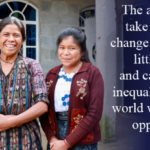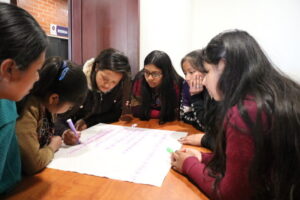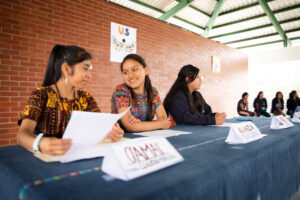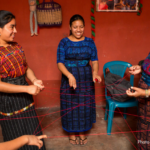
Educating For Change
Inequality is present in several areas and affects the development of society. Many today work for the development of our country—Guatemala—especially in rural indigenous communities where this problem occurs more

IN THE CONSTRUCTION OF A FREE AND INDEPENDENT STATE, DOES INCLUSION FIT?
By: MAIA Girl Pioneers Marta, Mishell, and Rosangela
On September 15th, 2021, Guatemala will commemorate 200 years of independence. Rather than celebrating this date, we came together to reflect on Guatemala’s ancient and intertwined history. During the process, we found that Guatemala carries with it a great history that very few know of. Perhaps no one has the absolute truth. However, all of us must know it. It is important for us to take this critical step to analyze problems in Guatemala from multiple perspectives, exchange ideas with our peers, and discuss the history of Guatemala to identify the challenges that still lie ahead.

200 YEARS AGO…
The signing of independence was a symbol of the creation of a free nation. Independence occurred through the demands of the people, but there was no equitable representation. In 1821, only some people participated in the act of the Signature of Independence. Not all ethnicities were represented or taken into account. At that time, Indigenous peoples had no power to guarantee their representation. There was no democratic system that ensured that people with citizenship hold the universal right to vote. In the past, only well-educated people and those with an advantageous economic position could vote. This automatically excluded the poor and Indigenous populations. [Within the Declaration of Independence], some points stood out, but for the benefit of the people who signed it. At that time, independence did not ensure the participation of Indigenous peoples.
DIVERSITY IN GUATEMALA
Guatemala is a multicultural and multilingual state. Each town has its unique cultural richness. There is diversity of cultures, and there is also a diversity of ideologies, religions, sexual preferences, and more. For this reason, open and sincere dialogue is complex because we all always want to win from our position.
In Guatemala, there are several languages, which enrich people. In the case of the municipality of Sololá, where we are from, some of the languages spoken are Kaqchikel, Quiché, and Spanish. The customs and traditions are different in each region depending on their beliefs. From the Maya culture, we inherited a relationship with nature, and it is appreciated at all times. Clothing is also different. The customs, such as the fairs or activities to honor historical events, also make us diverse. The practices and values are lived.

In Guatemala, religions and beliefs are diverse. Each group has its ideology. The person and their way of acting in society are built from these beliefs. People have different lifestyles. Each person influences society and is not always accepted in it.
In the country, there are various economic activities such as agriculture and commerce. We tend to have high creativity, such as using natural elements for activities like handicrafts.
Regarding the diversity in education, the educational quality is different depending on the academic center, and some establishments are Christian, others Catholic, and others without religious orientation. Additionally, there is diversity depending on interests, economic capacity, and other factors in terms of professions
Diversity is everywhere. For example, there is also sexual diversity. Sexual diversity is taboo. It is respected in some cultures but not in others, depending on its principles.
No less important, in the political sphere, there are different leadership roles and positions.
In Guatemala, we are mainly united by the desire to see a better country where the law is respected, assuring equality despite diversity in gender, culture, and beliefs, among others. As citizens, we are entitled to the same effective and quality education.
Together we hope for no more corruption, especially a president who is not involved. We want the economy to improve, to be a country with opportunities where poverty is reduced.
 OUR PROPOSAL FOR THE CONSTRUCTION OF A FREE, INDEPENDENT, AND INCLUSIVE STATE
OUR PROPOSAL FOR THE CONSTRUCTION OF A FREE, INDEPENDENT, AND INCLUSIVE STATEGuatemala can change the state exclusion of Indigenous peoples from political matters established during the Independence process since it has the tools that allow their inclusion. For example, we see Mercedes Coroy standing out in the cinema and Thelma Cabrera reaching a high level in her political nomination. 200 years ago, when Independence occurred, there was no representation of all people. Still today, many entities are working on this, including the Development Councils System, a network of individuals who defend human rights. Now, we see people involved in decision-making spaces.
The proposal lies in the concept of democracy, where ALL people must be included and reflected in the different decisions that affect the country. Peoples’ needs must be met. A free and independent state must be inclusive. Freedom includes, for example, the liberty of expression of its population, which is legally allowed even if not respected in some places.
There is also the right to vote, which is when people decide on their representatives, and there is freedom in choosing the representatives they want for the country consciously. Voting reflects inclusion in a state, and voting is now a fundamental right of every citizen of Guatemala, not as it was in the past when only landowners or men had the right to vote. These principles and values play a crucial role in achieving a good coexistence between diverse ethnicities and ideologies.
To be an independent and free country for all, we must analyze some challenges. Currently, Guatemala is an independent country, but, in reality, it depends on other countries to meet its needs. Another significant obstacle to overcome is guaranteeing respect for those differences and consider diversity as a chance to learn from other people and expand knowledge. This approach allows us to understand the different points of view and find a more comprehensive solution. For this, we must promote respect within diversity inclusion, knowing that we fundamentally have the same rights.

Inequality is present in several areas and affects the development of society. Many today work for the development of our country—Guatemala—especially in rural indigenous communities where this problem occurs more

When I was seven years old, I began to work selling bracelets on the street with my older brother. Maybe we sold to you or someone you know in Panajachel?

MAIA USA
Tax Identification Number (EIN) 68-0652444
Asociación MAIA
Tax Identification Number (NIT) 6896913-9.
Guatemala Office:
Km. 137, Caserío Xolbé,
Cantón El Tablón, Sololá, Guatemala
US Office:
1031 33rd Street, Denver, CO 80205